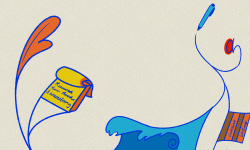I did not go to school last year. For the first time since toddlerhood, I woke up on September 1st and did not pack up my new Jansport full of No. 2 pencils and lined paper, and go to class. I did not reconnect with familiar friends, nor was I forced to play icebreakers with hordes of equally confused new students. Instead I cooked breakfast in my first apartment, walked to the Museum School of Fine Arts, and unloaded a spectrum of oil paints and varied sizes of pre-stretched canvas. I hoped that I would prove them all wrong—my doubting friends and cynical skeptical superiors—and come away from my year off with an increased knowledge of the world and a better understanding of myself. But as I looked around the room of much older art students, I began to fear that I had made a terrible mistake, sealing my fate on the road to inevitable failure.
Why was I in this art class to begin with, far removed from the typically awkward college-orientation programs, where my former classmates were all happily situated? Why would I give up a good game of human knot or 20 Questions to live in a small apartment in Boston and travel around with just a huge backpack? The answer to these (completely reasonable) questions is that I took a gap year.
Now, I know the stigma that goes along with the term “gap year.” You may envision me as some over-privileged Gossip Girl wannabe on Daddy’s yacht, “recovering” from a stressful senior year of high school, doling out twenties to hot men waving large palm fronds. Let me tell you, there were no yachts involved, and the majority of twenties I dispensed at the hardware store, where I bought traps to murder the mice who routinely nibbled holes in just about everything I owned.
My gap year, though far from Blair Waldorf-ish, was not entirely confined to heavy backpacks and peckish rodents. I also did all the cliché, but wonderful, bohemian stuff: strolling along the Charles River in Boston, and later the Seine in Paris, buying baguettes, reading Proust in cafes, and spending hours in one of the many art museums. I also knew that my schedule shouldn’t just be “time off,” but a productive and fulfilling year. For the first six months, I found work at the Institute of Contemporary Art in Boston and enrolled in the Continuing Education program at the School of the Museum of Fine Arts. When I was not working or painting and drawing, I immersed myself in Boston’s cultural scene by visiting museums and attending lectures. I took French classes and planned my spring, an exploration of the artistic Meccas of France and Germany.
A three-month backpacking experience is impossible to encapsulate in one paragraph, but here goes: I found work on a self-sustaining farm in Trets, a small village outside Aix-en-Provence. The farm accepted international volunteers and provided food and housing in exchange for labor. I helped plant and harvest vegetables, rebuild a horse stable, weed the fields, and prepare food for the farm’s restaurant. I was only allowed to speak French on the farm, which, while scary at the beginning, proved a most efficient study of the language. After the farm, I packed my backpack and traveled the country, spending time in Toulouse, Lyon, Nice, and Paris, living on baguettes and visiting art museums. After France, I took the Eurorail to Berlin, Munich, Frankfurt, and Hamburg and then spent my last two weeks in Europe at another service project in Marburg, Germany, where I helped to renovate a youth holiday camp and took introductory German classes.
Now that I am in college, my gap year over, my life back to “normal,” I spend a good deal of time fielding questions, many of which seem to stem from the same worry my friends and teachers expressed when I first presented my idea of a gap year. “Why would you do such a thing?” “What do your parents think?” “Were you nervous?”
Most of those questions are good, valid, and a little scary (the scariest of which came from my next door neighbor, who was under the impression that I was working at the Gap all year). Before my year off, and many times while in its midst, I felt their same worries and could not always come up with an answer that proved to them or to myself that what I was doing was for the best. The key is to not look at it as a “gap” year—the experiences I had, the people I met, and the perspective I gained made it the best (and fullest) year of my life—so far anyways.




Great story–congratulations on making the leap and putting together such an impressive set of experiences for yourself. As the director of a nonprofit that provides gap year programs, I spend a lot of time trying to convince skeptical parents of their huge potential value for young people. So great to see stories like yours. I don’t think we have any alumni at GU, but do have a couple of amazing ones at AU (who spent gap years in India and Morocco). If you ever want to meet some other recent gappers in the area just let me know and I’ll pass along emails.
John Eastman
john@global-lab.org